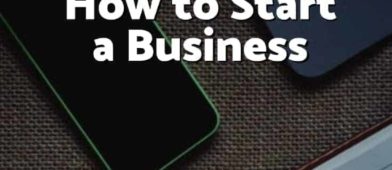In January 2005, I wrote my first blog post for Bargaineering. It was one of those cheesy “Hello World!” type of posts where I shared my plans for the nascent personal finance blog. I named it Bargaineering because I like finding bargains, I was (am?) an engineer, and I liked portmanteaus before I knew they were called portmanteaus.
(Unfortunately, Bargaineering no longer exists but here’s the first post via the Wayback Machine)
It would make a few hundred dollars that first year. It was a sum that vastly exceeded my wildest expectations. I told my then-girlfriend, now wife, that if Bargaineering paid for one vacation a year I’d be ecstatic. I didn’t even picture a nice vacation, I was thinking a road trip to a bed and breakfast somewhere nearby!
Fast forward to early 2008, my lovely wife and I were married. We went on our honeymoon to Hawaii for two weeks.
And I quit my comfortable job at Booz Allen Hamilton the day I came back.
In the years since, having experience even greater successes beyond even wilder expectations, I’ve often been asked how I made The Leap, a phrase coined by Tess Vigeland, to self-employment.
It was emotionally difficult because the future is so unpredictable.
With the benefit of hindsight, here’s how I remembered gaining the confidence to make this life changing decision.
Table of Contents
I Didn’t Hernán Cortés My Ships
Hernán Cortés was the famed Spanish conquistador that, upon landing in Veracruz in 1519, was said to have ordered his men to burn their ships.
The reasoning was that if you kept a backup, how committed are you to the mission?
If you could retreat to Europe, you had a way out.
Without ships — you succeed or you die.
People often point to that story and say “Wow, Cortes was smart!” (unless you lived in Veracruz already in 1519 but that’s another topic for another day)
I take a different view. How many explorers did something similar and were never heard of again? Survivorship bias at work my friends.
I did not burn bridges, ships, or anything else because that’s stupid. When I quit, I did it in a way where I could go back. I wrote a simple resignation letter and left amicably.
I might have to start over at the bottom of the org chart but that’s fine. I had the skills, had once been cleared to work in the defense industry, and “retreating” was still an option.
If things didn’t work out, I’d go back. That’s not to say it would’ve been easy to go back. There would’ve been quite a bit of pride swallowing but at least there was a way back.
You can push harder when you have a safety net.
I Built Up A Financial Runway
In Scott Trench’s book Set for Life, he talks about a financial runway. “A Financial Runway is the amount of time you could survive without the need for wage-paying work or actively working to produce income.” (from his guest post)
I used a similar idea in 2008 – I took the income I earned on the side and calculated it as a multiple of my full-time job’s salary. If my salary was $60,000 and I made $120,000 – I “bought” myself two years. I set my financial runway ats two years because I “pre-earned” that income.
When I quit, I had amassed ~10 years of financial runway. I knew that even if this whole blogging thing flamed out, I’d be 10 years ahead of schedule and had that much time to figure out the next thing. (or go back and perhaps retire a little early)
I Knew I Wasn’t a Corporate Highflier
When I quit my job in 2008, I’d been working in the defense industry for five years. That’s long enough to know who is a high flier on the fast track and who isn’t.
I wasn’t.
This meant that my growth trajectory was going to be fairly mundane. I’d get my annual ~2-4% raises, mix in a few promotions that might get me a higher raise, then retire after 40 years. I could switch companies for a 15-20% raise every so often but do that enough and you run out of companies or develop a reputation (or so they say, I don’t believe it).
The corporate life would’ve been good, comfortable, safe, predictable… and it would check off all the “life needs” boxes for me. If it weren’t for the blog doing well, I know I’d still be there now. It’s a great life, no doubt about it.
When my hard work and good fortune put a rocket ship in front of me, I decided safe and comfortable were great but a rocket ship is a freaking rocket ship. I got on and held tight.
I Had a Strong Emotional Support Structure
Speaking of safety nets, the real safety net was my lovely wife. It’s no surprise I quit the day we came back from our honeymoon (though the decision was made long before).
There was the tangible safety net – she was employed, had a great salary and career arc, and had health insurance.
Then there was the intangible emotional safety net – the incessant cheerleading that, when it’s happening, seems silly and pollyannaish. The reality is that there is something to be said about unwavering outside support when you’re internally wavering.
I firmly believe that human beings make decisions emotionally and look for logic to support them. Her emotional support paved the way for the logical reasons.
She’s the real rocketship.
There Was a Nascent Personal Finance Blogging Community
Nowadays, you have a huge personal finance blogging community and a variety of forums to visit if you want to talk to money bloggers.
Every year I go to FINCON, which is an annual conference attended by over a thousand bloggers and members of the media. It’s put on Phil Taylor, founder of PT Money, and his fantastic team. Phil’s been blogging for over ten years too. There are separate FINCON Masters events, smaller events held in other major cities throughout the year. There are casual meetups in various locations throughout the year.
If this all existed back in the mid-2000s, I may have quit my job even sooner. We had a smaller community, focused around forums, but even then it was a fun community to be a part of and share ideas. Facebook didn’t go public outside of universities until 2006.
The community exists today is amazing and so incredibly supportive. It’s also just a lot bigger, with people sharing their experiences, more vibrant and connected version of what existed when I quit.
YOLO!
Just kidding — I didn’t quit because you only live once.
I quit because I had good models.
My grandparents (on both sides) did different but similar versions of escaping to Taiwan from China. My parents left Taiwan for the United States. Quitting a well-paying job for the lure of entrepreneurship, while not on the same level of risk and danger, was my version of leaving comfort in search of something more. They sought to level up and so did I.
So far, so good… but don’t underestimate the power of models.
If you’re on the verge of making a similar decision and want someone to talk to, email me or leave a comment.




Lance @ My Strategic Dollar says
Sounds like you had a plan in place and executed it well. Congrats on taking the leap and becoming successful!
A plan is crucial, it may not always work but you need a plan!
Physician on FIRE says
You were smart to build up that “financial runway” first. I’d hate to see someone without much to their name quit a job to blog full time based on some income reports that flashed across their Twitter feed. It’s also helpful to have some momentum with the blog — to have proven you can make some money and attract readers — before pulling the plug on full time work.
I started Physician on FIRE to share the concepts of financial independence with physicians and similar high income professionals. At the time, I figured I’d work another five years full time. Not even two years later, I’m a part timer, and I may very well be done working in medicine two years from now. Seeing the blog gain some traction and provide some income has made those decisions much easier.
Cheers!
-PoF
I never believed in “just quit, you’ll figure it out later” but that’s what some people suggest! Maybe it’s because I’m an engineer at heart and find that unnecessary risk-taking is silly?
Bernz JP says
It took me about two years of being in the “should I do it or not” status before I finally decided to quit my job. All I can say is you’ll know when you’re ready. Never rush!
Thanks.
I think a lot of folks hoping that quitting their job is the “last piece of the puzzle” towards success, which can be very dangerous. It’s usually not the last piece, or even a critical piece, because there are so many things you can succeed at in the off hours. If you can’t make it work from 5 to 9, why would it work from 9 to 5 + [RIDICULOUS FINANCIAL AND SOCIAL PRESSURE TO SUCCEED]?
It’s crazy!
Mr. Freaky Frugal says
Wow, you’ve been doing the successful blogging thing for awhile. I’m impressed!
I’m already FIREd and I gotta agree with you – a supportive spouse is key. There is no substitute.
Also, thanks for pointing out the Wayback Machine. I had no idea it existed.
I’d really love to read more posts by you on the business of blogging. Any chance you’ll write more?
The support system is everything. You don’t understand that when you’re young, because you can’t see past the performance of the individual, but the support system makes sure the individual can perform. For every athlete, there’s a family and system behind them helping them succeed (or the absence results in their failure). It’s not always obvious, which makes it a difficult lesson to see, let alone learn.
Maybe I’ll write more? I find that it has limited appeal (only to other bloggers) but where it intersects general personal finance subjects it’s made its way to the blog (like this post, which is related tangentially). 🙂
Gwen @ Fire Drill Podcast says
I picked the wrong time to read this blog! Now I want to quit my job yesterday! Too bad I need to build up that financial runway a lot more before I can do so. Like you, though, I’ll have an amazing support system when I do quit. That’s much better than quitting and doing it by yourself!
Yes! 100% better than doing it yourself – also, with so many other personal finance bloggers out there, you have a business support structure too!
Ms. Frugal Asian Finance says
I saw a snippet of your post in the email notification and had to finish reading it here on your blog. It wanted to read your older posts on Bargaineering, but as you mentioned, it no longer exists. I also have a similar Hello World post which I later realized was full of errors and typos. But I guess it doesn’t really matter because it was just the beginning hehe.
You have such an inspiring story! I really like the posts where you talk about yourself on Wallet Hacks! 🙂
Thank you! 🙂 I’ll try to do more.
Shannon says
Good work Jim, but do you think that Blogging is the way to go. It seems that market is saturated and is a little bit late to jump on it.
It’s never too late to do anything, it’s just harder to stand out.
I wouldn’t read this post as a “hey you should get into blogging” but more “if you want to make a change from your career, here’s how I went into something super crazy (blogging) without being crazy about how I did it.” It applies to a new job, a new city, a new anything.
Bernz JP says
Thanks for this inspiring story Jim. Here’s my short story. Was working many hours at my government job but never like it. I was raising my family and job stability was extremely important to me but subconsciously the thought of quitting my job and start a business was always with me. I’ve always been passionate about starting an online business. I remember printing marketing materials almost on a daily basis and reading them during my work breaks. One of the blogs that really inspired me was Steve Pavlina and his article https://www.stevepavlina.com/blog/2006/07/10-reasons-you-should-never-get-a-job/
Started affiliate marketing in 2005 and finally with 100% support from my wife was able to quit my job in the summer of 2007. Thank you again and please continue inspiring people.
I remember Steve Pavlina! He was lifestyle hacking way before Tim Ferriss gave it a name.
2005 was such a long time ago huh? It’s great you were able to parlay that into a new career. Support is everything.
Bernz JP says
Steve’s blog at that time based on what I read was already making $40k/month and I was really inspired by it.
Yes, started affiliate marketing in 2005, quit my job in 2007 but my best years were 2008 and 2009.
Thanks
I don’t know how much he was making but I do remember he was doing it full time, which was great. It also let him do that polyphasic sleep stuff, which I found fascinating. One of the benefits of these new sources of income is that people can experiment!
Steveark says
I was on the corporate fast track which both made work fun and also enticed me to hang around well past where the income mattered anymore. I did slightly early retire a couple of years ago and probably wouldn’t change when I pulled the trigger if I could go back and relive it because I did love my job most of the time. Now I love my many side gigs both paid and volunteer and enjoy life even more. But as the wise Doc said in his comments having the financial runway is huge, and as you said burning bridges might be flamboyant but it is also crazy. My side gigs keep my brand alive enough that I turned down a seven figure job offer a couple of weeks ago, the third fat job offer this year including one in Hawaii and one only three miles from my house. The fact that I didn’t even have to stop and think before saying “thanks but no thanks” makes me feel pretty good about where I am now. That’s reason enough not to completely disconnect from your past.
Yeah, I never understood why people would argue for leaping without a safety net or burning your bridges. Why would you ever want to burn bridges? It just seems MEAN, first of all, and if things don’t work out, you’re screwed. The whole “no backup plan is great!” strikes me as foolhardy. 🙂